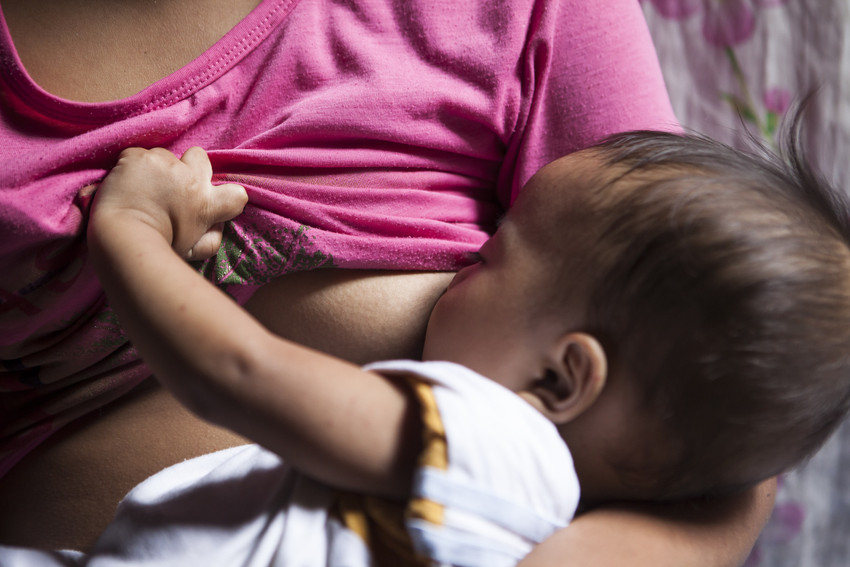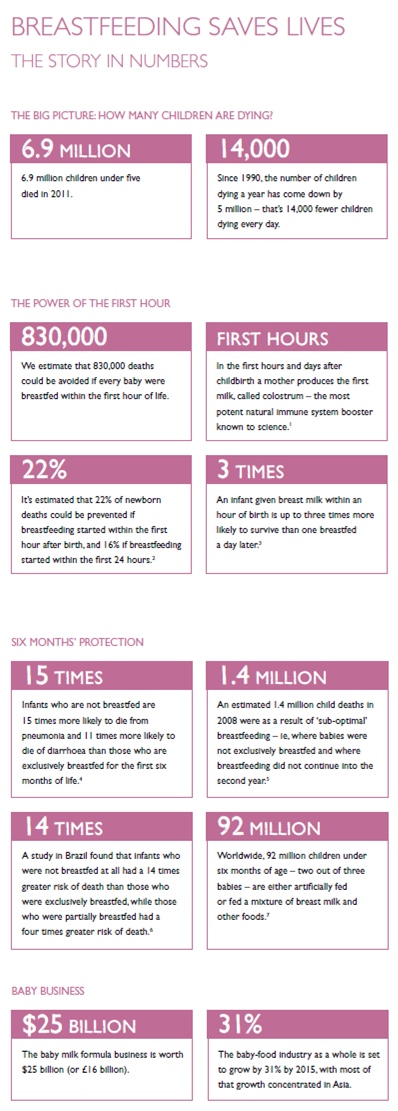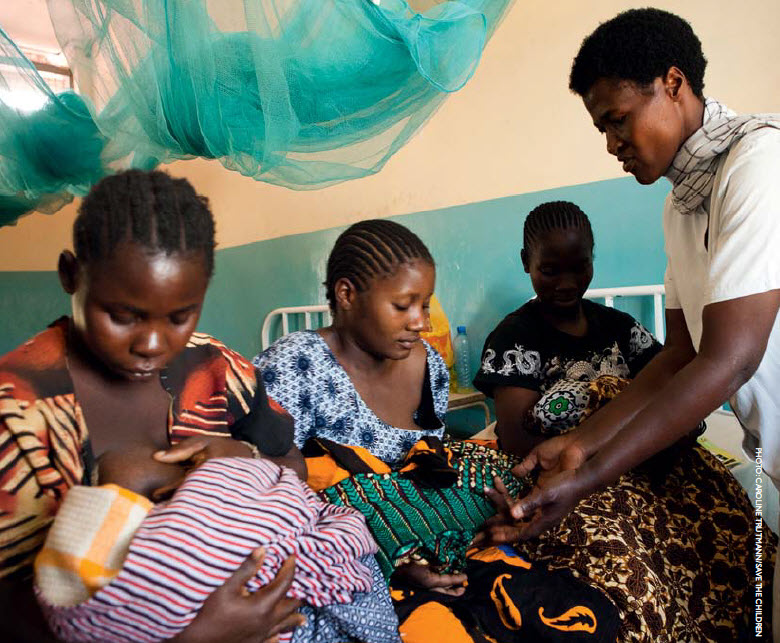How Breastfeeding Saves Lives ... And How YOU Can Help
 Friday, February 15, 2013
Friday, February 15, 2013 830,000 newborn deaths could be prevented if babies were breastfed within the first hour.
1.4 million child deaths could be prevented if optimal breastfeeding practices were followed (exclusive breastfeeding for the first 6 months and continued breastfeeding until at least 2 years).
 Vilma, 20, breastfeeds her youngest child, Alderico (10 months), in their one room home in an urban slum in Paranaque City, Metro Manila, The Philippines on 18 January 2013. Vilma had raised her first 3 children on formula and had to cut down on food for her family to afford it. Both John Ashley, 4, and Justin, 3, are malnourished and stunted, and after losing one of her children, she now breastfeeds her youngest, Alderico. Image Credit: Suzanne Lee / Save the Children (Used With Permission).
Vilma, 20, breastfeeds her youngest child, Alderico (10 months), in their one room home in an urban slum in Paranaque City, Metro Manila, The Philippines on 18 January 2013. Vilma had raised her first 3 children on formula and had to cut down on food for her family to afford it. Both John Ashley, 4, and Justin, 3, are malnourished and stunted, and after losing one of her children, she now breastfeeds her youngest, Alderico. Image Credit: Suzanne Lee / Save the Children (Used With Permission).
Overcoming Barriers to Breastfeeding Will Save Children's Lives
 Source: Save the Children, Superfood for Babies -- How Overcoming Barriers to Breastfeeding Will Save Children's Lives (2013). A new research report released by Save the Children today underscores the importance of breastfeeding in saving babies' lives.
Source: Save the Children, Superfood for Babies -- How Overcoming Barriers to Breastfeeding Will Save Children's Lives (2013). A new research report released by Save the Children today underscores the importance of breastfeeding in saving babies' lives.
In developing countries, malnutrition is still a significant problem -- it was the cause of one third of the 7 million child deaths in 2010. According to the Save the Children report, breastfeeding is "the closest thing there is to a 'silver bullet' in the fight against malnutrition and newborn deaths." Although child mortality rates are decreasing overall, a greater proportion of deaths now occur during the first month.
The Save the Children report points out that breastfeeding could prevent a higher proportion of child deaths than any other intervention, including mosquito nets, vitamins, vaccines, clean delivery, water and sanitation, and more.
Yet breastfeeding rates globally have remained stagnantly below 40% for the last 20 years. While progress has been made in some countries, there are other areas (especially in east Asia and the Pacific) where the rates are starting to fall with potentially disastrous consequences for babies' lives.
Why aren't more babies breastfed globally?
The report by Save the Children identifies four main barriers to breastfeeding globally (which align well with the types of barriers and challenges I've spoken about on this blog over the years). They are:
- Community and Cultural Pressures: Bad advice, denying newborn colostrum or giving other foods or liquids before starting breastfeeding, pressure from other family members (many women are not free to make their own decisions about how to feed their child).
- Health Worker Shortage: One third of infants are born without a skilled birth attendant present, making it difficult to ensure mothers have good breastfeeding support in the first hours after birth.
- Lack of Maternity Legislation: Mothers often need to return to work shortly after giving birth, cannot take their children with them, and do not have breastfeeding / pumping friendly workplaces.
- Big Formula: The marketing activities of formula companies continue to violate the WHO Code of Marketing of Breastmilk Substitutes, resulting in unnecessary and improper use of formula. Legislation doesn't exist or isn't enforced, leaving mothers and babies vulnerable to predatory marketing practices.
What Needs to Change?
To help overcome these barriers and ensure that more mothers are able to breastfeed their babies, Save the Children is asking world leaders, international institutions and multinational companies to implement the following four recommendations:
- Fund projects that will help overcome harmful practices and tackle breastfeeding taboos by focusing on changing the power and gender dynamics so that young women are empowered to make their own decisions about how to feed their babies.
- Ensure sufficient resources and infrastructure are in place to allow a skilled health worker to be present at every birth.
- Governments should introduce nationwide breastfeeding-friendly policies and legislation focused on maternity leave, financial protection for mothers on maternity leave, and employer support of breastfeeding women in the workplace.
- Improving breast-milk substitute industry (primarily the infant formula industry) practices through a combination of changes within the industry and better national regulation of marketing practices.
 Image credit: Caroline Trutmann / Save the Children (Used With Permission).
Image credit: Caroline Trutmann / Save the Children (Used With Permission).
The First Hour
What struck me the post reading the report were the figures on the estimated deaths that could be prevented through breastfeeding within an hour of birth. I've long known that it is a best practice, but looking at the significance of that seemingly little factor compared with all other interventions, amazed me.
Here is what the research said (from page 4 of the Save the Children report) :
Save the Children estimates that 830,000 infant deaths in developing countries could be prevented if every baby were given breast milk, and only breast milk, in the first hour. Using two studies from Ghana and Nepal, we calculated the effect that increasing the current rate of early initiation to 100% would have if all other factors remained the same. Infants who are not breastfed within an hour are 86.5% more likely to die during the neonatal period – the first 28 days of life – than those who are breastfed.
The study in Ghana found that 16% of neonatal deaths could be prevented if all infants were breastfed within 24 hours of birth, and 22% if breastfeeding started within the first hour of life. The study in Nepal found that an infant given breast milk within an hour of birth is up to three times more likely to survive than one breastfed a day later. Infants who are not breastfed until they are two days old are more than four times more likely to die.
My son wasn't breastfed within the first hour. I don't remember exactly when I first nursed him, but it certainly wasn't immediately and once I did, he didn't latch. He was born at 7:30am and I didn't get to see a lactation consultant until sometime the next afternoon (i.e. around 32 hours later) despite the fact that he wasn't latching on at all. If I could change one thing about hospital practices here in Canada, it would be to ensure that all moms who are planning to breastfeed are encouraged to nurse in that first hour and that they are referred to a lactation consultant immediately if things are not working. I shouldn't have had to wait that long to get professional help. I shouldn't have had nurses with insufficient training in lactation pushing formula on my child before I'd had a chance to see a lactation consultant. I shouldn't have had to see the pediatrician (who only did her rounds once per day) before getting a referral to the lactation consultant.
Globally, if I could change one thing it would be to ensure that all mothers have access to a skilled birth attendant who is trained in breastfeeding best practices, whether they are delivering their baby at home, at a birth centre, or at a hospital.
As I've said before, moms don't need more pressure to breastfeed. But they do to be empowered and supported in their feeding choices. At the moment, that still isn't happening. In some cases, that means moms cannot meet their own breastfeeding goals. In other cases, especially in the developing world, it is still an issue of life or death.
What Can You Do To Help?
If you want to help save babies lives and ensure mothers are empowered in their feeding choices, you can:
- Sign the petition calling on Nestlé and Danone to change the way they market infant formula to comply with the WHO Code of Marketing of Breastmilk Substitutes.
- Donate to Save the Children's No Child Born to Die campaign to help tackle malnutrition and overcome the global shortage of health workers.
- Write to your local hospital, member of provincial parliament, and health minister, asking them to ensure that all mothers who are planning to breastfeed are encouraged to breastfeed within the first hour of birth and that they have immediate access to lactation consultants if they are having any difficulty.
- Read the Save the Children report to educate yourself and so that you can educate others about the issue of breastfeeding globally. Some of the statistics on breastfeeding in countries around the world are staggering and fascinating.
- Encourage companies you work for or buy from to sign on to the C.A.R.E-WHO Alliance coordinated by Best for Babes, demonstrating their commitment to caring about moms and babies and complying with the WHO Code.
- Blog, Tweet, Facebook or otherwise share the Save the Children report or this blog post.
What do you think needs to change to increase breastfeeding rates globally?
Note: The date is incorrect on this entry -- it was first published on the morning of February 18, 2013.




















Reader Comments (6)
The Philippines Government introduced strong marketing regulations in 2007 in the face of legal challenges by the baby food industry and a threat from the US Chamber of Commerce that US companies would disinvest if the regulations went ahead. An international campaign of solidarity supported the Government then - and now it is needed again.
The industry does not give up and right now it is trying to have the regulations replaced with its own weak law so it doesn't have to put clear warnings on labels and some of the restrictions on promotion will be scrapped.
Nestlé is leading the industry effort. Members of Congress are being told that jobs and investment will be lost if most of the restrictions on promotion are not removed.
The Ministry of Health has said the draft law: "aims to support multinational companies while damaging the Filipino society: families, the mothers and children."
Baby Milk Action - which promotes a boycott of Nestlé over its baby milk marketing practices - and our partners in the International Baby Food Action Network welcome Save the Children's campaign on infant and young child feeding. Our statement, with information on the threat to the law in the Philippines, is available at: http://info.babymilkaction.org/pressrelease/pressrelease17feb13.
Thank you so much for this post, those numbers are astounding!
These statistics are astounding. And terrifying. Thank you so much for the list of ways we can help to change this.
I'm feeling so lucky that I was able to breastfeed my daughter about ten minutes after she was born. I had no idea what I was doing, but I was supported and encouraged.
Bravo! Well stated! I've been a supporter of the WHO Code since it's inception. I still even have my 'Nestle boycott list' from the 1980s taped to the old fridge in our garage!
Thank you for continuing this dialogue.
My experience in Australia is that we breastfeed as soon as the baby is born. Unless, there is an issue with bubs where they need medical attention. Both my children were given to me to feed as soon as I was out of theatre (2 emergency C-sections). That time is so special and important and I believe is what starts them off. However, there is still quite a bit of stigma around stopping breastfeeding at a certain age. My first was fed until he wanted to stop at around 2.5 years, but I was constantly asked when I was going to stop. A lot of people think that it isn't necessary after 6 mths. They take the recommendation to feed until 6mths way to literally. Unfortunately there is also quite a lot of false info around about how hard it is, etc. You are told before bubs is born that you will have to feed them between 12 & 18 times per day. That is not my experience and although it is for some, it scares mums from even trying it.
There is so much value to this report. There are only two concerns I have that I wish had been addressed better.
The first is the reference to breastmilk as a "Superfood". Language of decreasing risk, instead of artificial milks increasing risks. I think that in our world that is so dominated by the marketing of the formula industry that it is essential to watch that we are using language of breastfeeding as the norm, and not adopting the language of formula marketing.
Second is the report speaks from the view of the benefit to developing countries. At first I shrugged this off as being a limitation of the mandate of Save the Children. I went looking to confirm this for a friend who shared this concern, and was disappointed to see that Save the Children is actually quite active in developed countries as well. As someone trained to provide breastfeeding support I hear the argument that using formula is only a problem for developing countries where water quality and education are problems (in terms of using formula properly).
Although there are populations which can tolerate formula use less, it does not make breastmilk non essential to babies in educated and wealthy areas. We need to express the immense need for breastfeeding and breastfeeding support for developing countries without watering down the message of the importance to babies in wealthier countries with equally, or more dismal breastfeeding rates.
Thank you to Save the Children for bringing attention and much needed research to such a vital human rights issue.